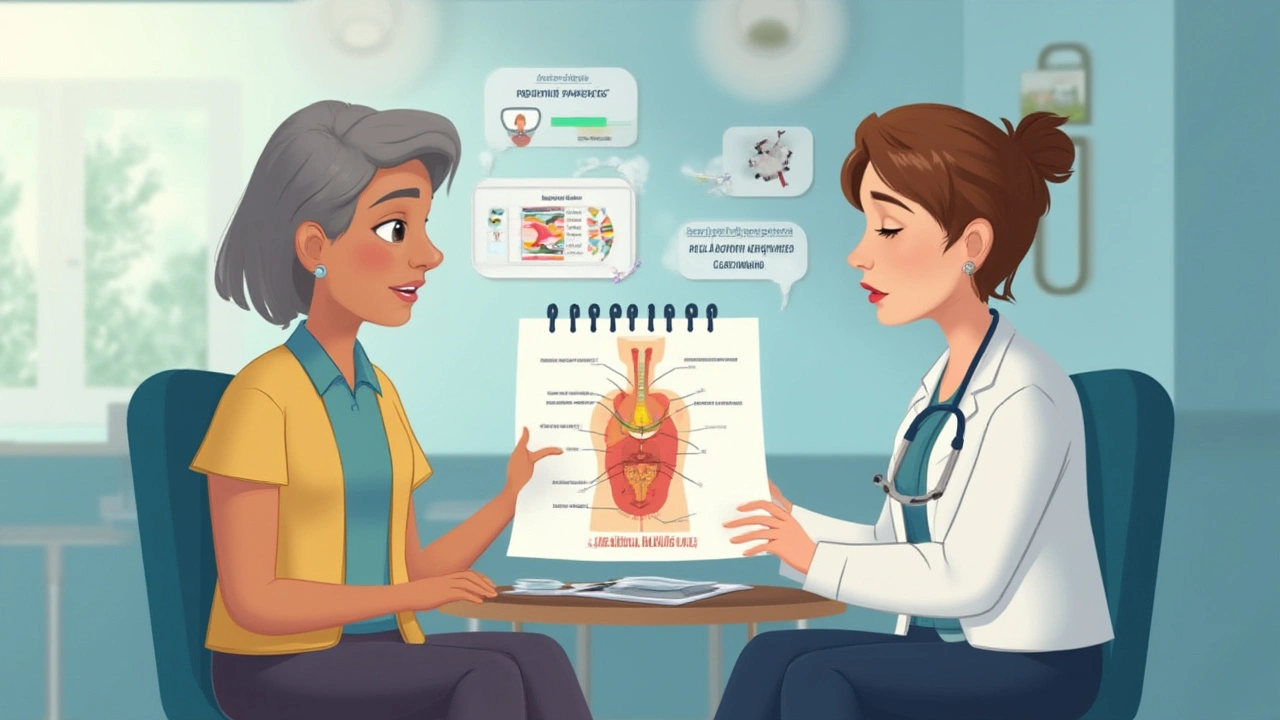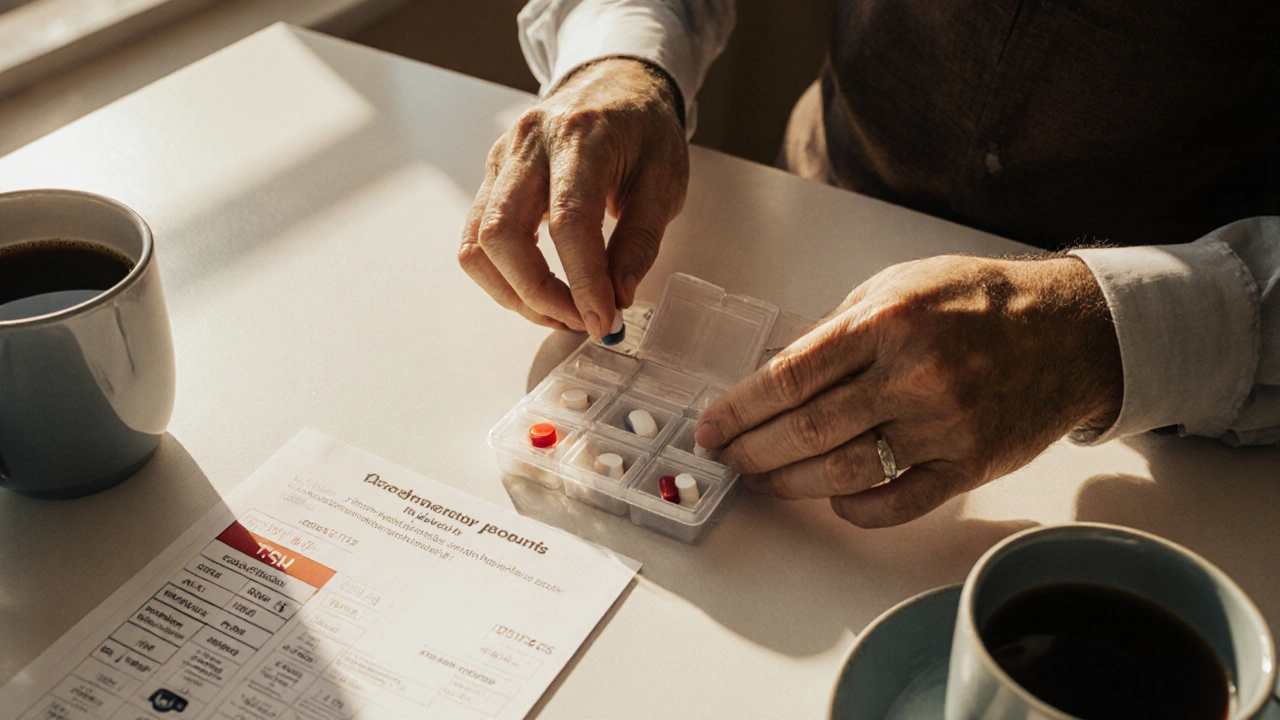Your thyroid is tiny—about the size of a butterfly resting on the front of your neck. But mess with it, and your whole body feels the change. Levothroid isn’t a word that pops up at dinner parties, but for around 3% of adults in Britain with hypothyroidism, it’s vital. If you’re reaching for those little white tablets every morning, or you know someone who does, you know the story: fatigue that won’t budge, brain fog so thick you can barely remember your own phone number, dry skin, hair shedding by the handful, stubborn weight gain. The NHS estimates over 1.5 million people in the UK currently depend on synthetic levothyroxine like Levothroid to stabilise their thyroid after it’s slowed to a crawl.
What Is Levothroid and How Does It Work?
Levothroid is the brand name for levothyroxine sodium, which is simply a synthetic version of thyroxine (T4)—the main hormone produced by your thyroid gland. Without enough T4, your metabolism slumps, which impacts almost every organ in your body. Levothroid is designed to stand in and do what your thyroid can’t. It’s absorbed through your gut and gets to work mimicking natural thyroxine, helping to steady your metabolism, boost your energy, support healthy skin, regulate your mood, and keep your heart ticking as it should.
A fun fact: the synthetic version was first made in the 1940s, and before that, treatment for hypothyroidism involved grinding up pig or sheep thyroid glands—hardly dinner-table fare. Levothroid made things much easier, with reliable dosing. In a 2024 NHS report, the most prescribed dose sits at 50 micrograms, but your own dose might be higher or lower, depending on blood test results.
Some people call Levothroid a “forever medicine.” For most, that’s true—if you need it now, you’ll probably need it for life. But the dose isn’t always fixed. Major changes like pregnancy, weight gain or loss, or shifts in other medications can mean you’ll need follow-up blood work, usually every 6-12 months. About 30% of people may need a dose adjustment within the first two years.
Levothroid is typically taken first thing in the morning with a glass of water, at least half an hour before breakfast. That’s because certain foods—like coffee, soy, or calcium—can block how much you absorb. And here’s something a surprising number of people don’t know: even vitamins containing iron or calcium can reduce absorption, so take those at least four hours apart.
One practical tip: if you forget your morning dose, don’t double up the next day. Just take it as soon as you remember, and get back to your normal schedule. Taking a double dose can make you jittery, anxious, or give you heart palpitations—none of which are any fun on an average weekday.
| Key Stat | Detail |
|---|---|
| People prescribed levothyroxine in UK (2023) | 1,555,000 |
| Most common patient age group | Women aged 40-65 |
| Average daily dose (mcg) | 50-100 |
| Frequency of blood tests after diagnosis | Every 6-12 months |

Who Needs Levothroid and What Should You Expect?
Levothroid is prescribed for anyone whose thyroid won’t make enough thyroxine, known as hypothyroidism. The usual culprit is Hashimoto’s disease—a condition where the body’s immune system attacks its own thyroid. Women are much more likely to develop it than men. Other triggers include surgical removal of the thyroid (common treatment for thyroid cancer or severe goitre), certain medications (like lithium or amiodarone), iodine deficiency, or damage from radiation therapy.
So what should you actually expect when starting Levothroid? No fireworks or instant transformation—improvements come gently, often over several weeks. But you should start noticing your energy return, and those freezing-cold hands and feet might warm up. Hair stops shedding quite so much, and—best of all—you remember where you put your keys again. According to a 2022 NICE patient survey, around 80% of respondents felt "markedly better" after three months, but about 1 in 10 still struggled with persistent symptoms, even with correct dosing.
Common side effects? Most people find Levothroid well-tolerated, especially if dosing is right. But if the dose is too high, you’ll notice signs of hyperthyroidism: racing heart, sweaty palms, anxiety, trouble sleeping, or shakes. Too little, and those original symptoms—tiredness, weight gain, hair loss—just linger. If you’ve ever felt stuck in a Goldilocks situation (too much, too little, just right), managing Levothroid sometimes feels the same.
One lesser-known detail: certain drugs mess with how Levothroid works. Birth control pills, HRT, and anti-seizure medications are just a few. Always flag up any new scripts to your GP or pharmacist.
And the blood tests? Here’s the thing: TSH (thyroid-stimulating hormone) is usually the main marker checked. Too high means your dose is too low, and too low means it’s too high. But sometimes you need a check of free T4 too, especially if symptoms don’t quite line up with blood results. Everyone’s a bit different, and the range for ‘normal’ TSH is surprisingly broad.
Struggling with persistent symptoms even though your results are perfect? You’re far from alone. Around 10-15% of patients feel less than great even with textbook-perfect bloodwork. Diet, other hormones, mental health, and lifestyle all play a role. Some find help in support groups or by noting symptoms in a diary to spot patterns.

Living Well with Levothroid: Day-To-Day Tips and Real-World Challenges
Getting the benefit from Levothroid isn’t just about swallowing a tablet in the morning. Here are a few ways you can smooth out the journey, based on real experiences and patient advice.
- Stick to a routine: Setting an alarm helps. I used to pop mine on my phone reminder because it’s easy to forget in a morning fog. Some folks keep the meds by their bed. Avoid taking with coffee, milk, or supplements high in calcium or iron.
- Be candid with your GP: If you’re still tired, feeling down, or struggling with symptoms even after months, speak up. Don’t suffer in silence or assume you just have to live with it.
- Watch for dose changes: Illness, stress, pregnancy, menopause, or big weight changes can mean you need more or less. If something big changes in your life, mention it at appointments.
- Track your symptoms: Write down energy levels, mood, body temperature, sleep, and hunger. It helps spot patterns and triggers, especially if you’re not feeling right.
- Don’t skip the blood work: Even if you’re feeling well, those checks catch issues before you notice them. The NHS has cut reminder letters to save money, so set your own reminders.
- Be aware of interactions: Over-the-counter antacids, calcium, and even some cholesterol or heartburn meds can mess with absorption. Leave a gap of at least four hours for those.
- Stay informed: NICE and Thyroid UK both offer easy-to-understand guides. There are also UK-based Facebook groups where people share tips and support.
- Balance your diet: Some swear by avoiding soy or too much high-fibre food at breakfast. Others have no trouble. If your dose seems all over the place, review your diet with your doctor.
- Get enough sleep: Thyroid ups and downs can wreck your sleep patterns. A regular wind-down routine makes a difference.
One challenge in 2025: levothyroxine supply issues hit headlines again this year. Some brands have been hard to find. Don’t panic-switch to a different brand without talking to your GP first because tiny differences in formulation can shift your hormone levels.
Another thing that comes up? Travelling with your tablets. Levothroid is fine at room temperature, but don’t store it in the glovebox on a hot summer drive. And always pack extra, just in case your travels get stuck in delays.
Insurance and cost is another question that pops up for some. In England, NHS prescriptions aren’t free unless you qualify for exemption, but Scotland and Wales cover them at no charge. If cost is an issue, check if you’re eligible for the NHS prepayment certificate—it can save hundreds per year if you’re on multiple meds.
Quick myth-buster: Levothroid isn’t a weight loss drug. Some wish it was—especially after gaining weight while undiagnosed—but kids, it doesn’t work like that. Taking more than prescribed is actually dangerous.
Finally, mental health matters. For lots of people, hypothyroidism takes an emotional toll: anxiety, depression, and brain fog are all part of the package, especially before treatment balances things out. It’s not all in your head. If your mood doesn’t rebound after your dose is stable, ask about counselling or peer support.
If you’re living with hypothyroidism, or supporting someone who is, remember: most people do well on Levothroid once they’ve found their perfect dose and routine. But it’s not just about popping a pill—it’s about learning your body, tracking those changes, and advocating for yourself. As someone living in a city that never skips a rainy day and with friends scattered around the UK, I've seen how much difference these little tips and tweaks make. You might not talk about thyroid hormones at every dinner, but if you ever need to swap notes, you’ll find there’s a lot more people on the Levothroid train than you’d expect.


Rajesh Kumar Batham
July 5, 2025 AT 11:17Hey folks 😊, just wanted to add that keeping your Levothroid dose consistent with a simple morning alarm can really cut down the morning fog, and placing the bottle next to your phone charger works like a charm. Also, a quick tip: if you ever switch to a different brand, check the inactive ingredients because a tiny filler can change how your gut absorbs the hormone. And remember, a glass of plain water is the best carrier – coffee, tea, or juice can interfere. 🌅
Finally, if you miss a dose, take it as soon as you remember but never double up – your thyroid will thank you!
Bill Gallagher
July 14, 2025 AT 17:30Let me unpack the intricacies of Levothroid administration, because the seemingly simple act of swallowing a tablet is fraught with variables, nuances, and caveats that many overlook, and understanding these can dramatically improve therapeutic outcomes; first, the timing of ingestion relative to meals is paramount, as proteins, calcium, and iron can chelate the hormone, reducing bioavailability, so a half‑hour fast is not a suggestion but a necessity, especially given the competitive absorption pathways in the duodenum; second, the impact of concurrent medications cannot be overstated, as antacids, certain cholesterol‑lowering agents, and even some antidepressants can alter gastric pH, thereby influencing dissolution rates, and this is why a thorough medication reconciliation at each appointment is indispensable; third, the physiological state of the patient-whether pregnant, menopausal, or experiencing rapid weight fluctuations-demands periodic dose recalibration, because the hypothalamic‑pituitary‑thyroid axis is highly sensitive to changes in metabolic demand; fourth, the subtle signs of over‑replacement, such as palpitations, tremors, or insomnia, often masquerade as anxiety disorders, making clinician vigilance essential; fifth, under‑replacement can perpetuate the classic hypothyroid constellation-fatigue, weight gain, cold intolerance-yet may be masked by other comorbidities, reinforcing the need for regular TSH and free T4 monitoring; sixth, the historical context, from animal gland extracts to synthetic levothyroxine, underscores how far we've come in standardizing potency, yet batch‑to‑batch variability still exists, prompting some patients to request brand consistency; seventh, the recent supply chain disruptions have highlighted the fragility of our pharmaceutical ecosystem, emphasizing the importance of having a backup plan, perhaps a documented plan with the GP for brand switches; eighth, patient education, often delivered via pamphlets or support groups, remains a cornerstone, because an informed patient is more likely to adhere, report side effects, and engage in shared decision‑making; ninth, lifestyle factors-dietary fiber intake, soy consumption, and even high‑dose vitamin D-can modulate absorption, necessitating a holistic approach; and finally, the psychological burden of chronic medication cannot be ignored, as it can affect self‑identity and quality of life, making multidisciplinary support vital. In summary, Levothroid is not just a pill; it's a complex therapeutic regimen that intertwines pharmacology, physiology, and patient behavior, and mastering it requires diligence, communication, and regular follow‑up.
Rajashree Varma
July 23, 2025 AT 23:43Finding balance with Levothroid is akin to walking a tightrope; the dose must be just right to keep the body in harmony, not too high to spark anxiety and not too low to linger in fatigue. Regular TSH checks act as the safety net, giving clear feedback on where adjustments are needed. Listening to subtle cues-like a sudden jitter in the hands or a lingering chill-can guide fine‑tuning before lab results arrive. Remember, the journey is personal; what works for one may need tweaking for another.
Anshuman Pandey
August 2, 2025 AT 05:57Embrace the routine as a daily affirmation of self‑care; a consistent morning dose signals to your body that you are taking charge. When life throws curveballs-stress, illness, or weight change-view them as opportunities to reassess and recalibrate, rather than setbacks. Small tweaks, like adjusting the timing around coffee, can create big gains in energy. Stay present, track patterns, and celebrate the incremental improvements that accumulate over weeks.
Thomas Malloy
August 11, 2025 AT 12:10Good summary.
Sushma Gowda
August 20, 2025 AT 18:23That exhaustive breakdown was spot‑on; just a quick addition-consider using a pill organizer with compartments labeled for each day. It eliminates the guesswork, especially when you’re juggling work and family, and it syncs nicely with the alarm reminder you mentioned earlier. Also, jotting down any new symptoms in a simple notebook can provide a concrete record for your next GP visit, turning vague feelings into actionable data.
Angie Wallace
August 30, 2025 AT 00:37Staying aware of the subtle signs is key; if you notice any unusual heartbeats or persistent anxiety, note it and bring it up at your next appointment. Keeping the conversation focused on facts helps the clinician adjust the dose safely.
Doris Montgomery
September 8, 2025 AT 06:50Honestly, the article feels over‑blown; most of the points are common sense and could've been trimmed down.
Nick Gulliver
September 17, 2025 AT 13:03While the UK system drags its feet with prescription delays, it's clear that a more efficient, market‑driven approach-like what we see in the States-would keep shelves stocked and patients uninterrupted. The bureaucracy here only adds needless stress to those already battling a hormone imbalance.